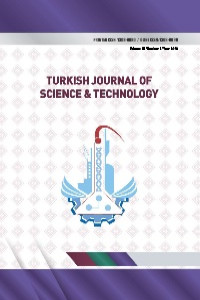Abstract
References
- Eliot Higgins, “We Are Bellingcat: An Intelligence Agency for the People”, Bloomsbury Publishing, 2021, pp. 9-63.
- Stevyn Gibson, “Open Source Intelligence, An Intelligence Lifeline”, Royal United Services Institute Journal, 2004, pp 5-6.
- Svetlana Tupikova, “Cognitive Foundations of Communicative Tonality”, Lambert Academic Publishing, 2020, pp. 28-44.
- A.G. Dodonov, D.V. Lande, V.V. Prishchepa, V.G. Putyatin, “Computer competitive intelligence”, Engineering, 2021, pp. 15-18.
- F. Pedregosa, G. Varoquaux, A. Gramfort, V. Michel, B. Thirion, O. Grisel, M. Blondel, P. Prettenhofer, R. Weiss, V. Dubourg, et al., “Scikit–learn: Machine learning in Python“, J. Mach. Learn. Res. 2012, pp. 2825–2830.
- We are social and Hootsuıte, “Digital 2020” report, 2021.
- Engin Sorhun, “Machine Learning with Python”, Abakus, 2021, pp. 9-43.
- Joseph M. Hilbe, “Practical Guide to Logistic Regression”, CRC Press, 2016, pp. 49-70.
- V. V. Stenanenko, I. I. Kholod, M. S. Kupriyanov, “Data Analysis Technologies: Data Mining. Visual Mining. Text Mining, OLAP”, BHV-Petersburg, 2007, pp. 194-223.
- Harkamal Preet Pal Singh Ubhi, “The Social Media Guide”, Rakuten, 2019, pp. 7-31.
- Bing Liu, “Sentiment Analysis”, Cambridge University Press, 2020, pp. 16-46.
- Michael Bowles, “Machine Learning with Spark and Python: Essential Techniques for Predictive Analytics”, Wiley, 2019, pp. 129-166.
Abstract
The purpose of this study is to learn how people who speak different languages interpret the same issues, and to compare the results obtained and show the difference between their perspectives. To learn this point of view, we must first turn to open source intelligence. In this execution, a sentiment analysis application was designed using the Python programming language and the Natural Language Processing algorithms in the texts, which were taken as a data set of comments in Azerbaijani, Turkish, Russian and English languages from social media. As the data set, the comments made on 4 subjects: the declaration of Hagia Sophia as a mosque, the objection events that started with the natural gas hike in Kazakhstan, the natural disasters in Turkey, the Ukraine crisis. After loading the texts in four languages from the network environment, after preprocessing, the text was divided into 8 different categories (neutral, fear, joy, anger, sadness, surprise, disgust, shame) by means of the application written in Python programming language based on Data Mining and Machine Learning topics. In the study, precision, sensitivity, accuracy and F1 score were obtained by using Random Decision Forests, K - Near Neighbor Algorithm, Decision Trees, Support Vector Machine, Naive Bayes Algorithm, Logistic Regression, which are machine learning methods. By comparing the results, it was determined that the Logistic Regression method obtained the highest result. A sentiment analysis model was created using the Logistic Regression method, and sentiment analysis was performed for each subject at separation and the results were compared.
References
- Eliot Higgins, “We Are Bellingcat: An Intelligence Agency for the People”, Bloomsbury Publishing, 2021, pp. 9-63.
- Stevyn Gibson, “Open Source Intelligence, An Intelligence Lifeline”, Royal United Services Institute Journal, 2004, pp 5-6.
- Svetlana Tupikova, “Cognitive Foundations of Communicative Tonality”, Lambert Academic Publishing, 2020, pp. 28-44.
- A.G. Dodonov, D.V. Lande, V.V. Prishchepa, V.G. Putyatin, “Computer competitive intelligence”, Engineering, 2021, pp. 15-18.
- F. Pedregosa, G. Varoquaux, A. Gramfort, V. Michel, B. Thirion, O. Grisel, M. Blondel, P. Prettenhofer, R. Weiss, V. Dubourg, et al., “Scikit–learn: Machine learning in Python“, J. Mach. Learn. Res. 2012, pp. 2825–2830.
- We are social and Hootsuıte, “Digital 2020” report, 2021.
- Engin Sorhun, “Machine Learning with Python”, Abakus, 2021, pp. 9-43.
- Joseph M. Hilbe, “Practical Guide to Logistic Regression”, CRC Press, 2016, pp. 49-70.
- V. V. Stenanenko, I. I. Kholod, M. S. Kupriyanov, “Data Analysis Technologies: Data Mining. Visual Mining. Text Mining, OLAP”, BHV-Petersburg, 2007, pp. 194-223.
- Harkamal Preet Pal Singh Ubhi, “The Social Media Guide”, Rakuten, 2019, pp. 7-31.
- Bing Liu, “Sentiment Analysis”, Cambridge University Press, 2020, pp. 16-46.
- Michael Bowles, “Machine Learning with Spark and Python: Essential Techniques for Predictive Analytics”, Wiley, 2019, pp. 129-166.
Details
| Primary Language | English |
|---|---|
| Subjects | Engineering |
| Journal Section | TJST |
| Authors | |
| Publication Date | September 30, 2022 |
| Submission Date | May 8, 2022 |
| Published in Issue | Year 2022 Volume: 17 Issue: 2 |


